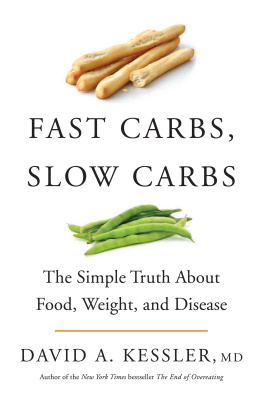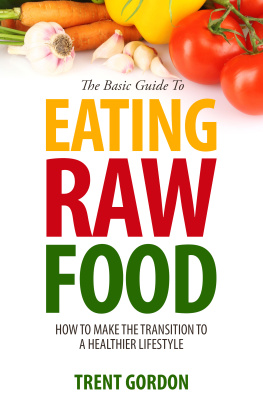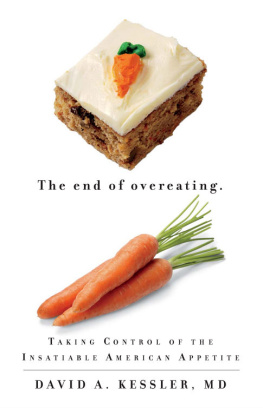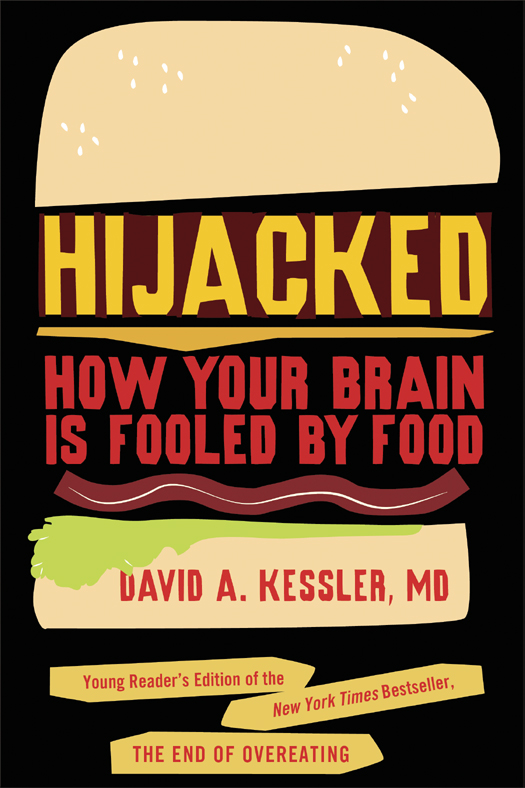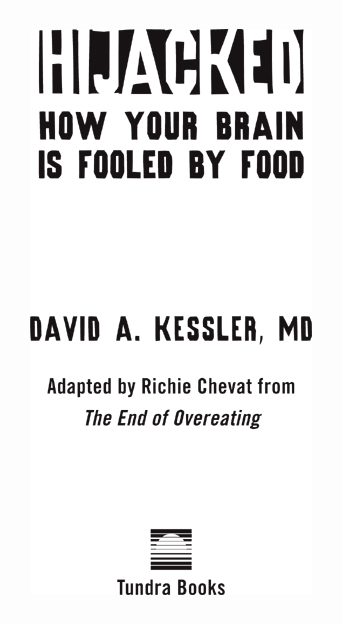Editors Note
For the purpose of this work, the following abbreviations are:
C = Celsius
g = grams
kg = kilograms
m = metres
ml = millilitres
Copyright 2013 David A. Kessler
Published by arrangement with Rodale, Inc.
First Canadian edition published by
Tundra Books, 2013
Published in Canada by Tundra Books, a division of Random House of Canada Limited, One Toronto Street, Suite 300, Toronto, Ontario M5C 2V6
All rights reserved. The use of any part of this publication reproduced, transmitted in any form or by any means, electronic, mechanical, photocopying, recording, or otherwise, or stored in a retrieval system, without the prior written consent of the publisheror, in case of photocopying or other reprographic copying, a licence from the Canadian Copyright Licensing Agencyis an infringement of the copyright law.
Library and Archives Canada Cataloguing in Publication
Kessler, David A., 1951
Hijacked : how your brain is fooled by food / by David A. Kessler.
eISBN: 978-1-77049-505-0
1. NutritionPsychological aspectsJuvenile literature. 2. Food habitsPsychological aspectsUnited StatesJuvenile literature. 3. ObesityUnited StatesJuvenile literature. 4. FoodMarketingUnited StatesJuvenile literature. I. Kessler, David A., 1951- . End of overeating. II. Title.
QP141.K47 2013 j613.2 C2013-900489-0
We acknowledge the financial support of the Government of Canada through the Canada Book Fund and that of the Government of Ontario through the Ontario Media Development Corporations Ontario Book Initiative. We further acknowledge the support of the Canada Council for the Arts and the Ontario Arts Council for our publishing program.
Cover designed by Leah Springate

www.tundrabooks.com
v3.1
CONTENTS
PART ONE
SUGAR, FAT, SALT
PART TWO
HOW THE FOOD INDUSTRY TARGETS YOU
PART THREE
UNDERSTANDING OVEREATING
PART FOUR
FOOD REHAB
PART ONE
SUGAR, FAT, SALT
CHAPTER 1
What IsOvereating?
I got the idea to write this book while watching a daytime talk show. On the show a psychologist was talking about why so many North Americans are overweight. He asked for a volunteer from the audience. A large, well-dressed woman named Sarah stood up. The psychologist asked Sarah to talk about her problems with weight.
At first Sarah was all smiles. I eat all the time, she said with a nervous giggle. I eat when Im hungry; I eat when Im not hungry. I eat when Im happy; I eat when Im sad.
Then the psychologist asked Sarah to describe how she felt about herself.
The sunny smile on her face faded. Sarah said she felt like a failure. She called herself fat and ugly. She said that she ate too much even though she knew it wasnt good for her. Afterward, she often felt angry with herself for not being able to stop.
I feel that I cant do it, she said, choking back tears. That I dont have the willpower. My whole thought is about why I eat, what I eat, when I eat, with whom I eat, she said. I dont like myself.
The psychologist asked how many in the audience had ever felt like that. About two-thirds of them raised their hands. They all had a problem with overeating.
Eating Is Making Us Sick
I use the term overeating a lot in this book. Youve probably never heard of overeating before, but I bet you know what I mean. Too many North Americans are just eating way too much. Were eating more than our bodies need. All that extra food gets turned into fat. And it is making us sick.
About one-third of all adults in the United States are overweight. Another third are obese. That means they are not just overweight, but extremely overweight. Being obese leads to many health problems, including diabetes, heart disease, and some kinds of cancers. Taken together, that means that two-thirds of Americans weigh more than they should to be healthy.
This is very personal for me because I am one of those people who has struggled with weight and overeating. I have lost weight, gained it back, and lost it againover and over and over. I have owned suits in every size. When I heard Sarah on that TV show, I knew exactly what she was talking about.
Im a doctor and I have often wondered why so many people, including myself, have so much trouble with eating. Its natural to eat when youre hungry. Its also natural to stop eating when youre full. Yet something is turning off the natural switch in our brains that tells us to stop eating.
Thats what I call overeating. Its when people eat all the time, whether or not theyre hungry. Its when people feel they have lost control and have to eat no matter how bad it is for them.
A Problem for Kids, Too
Overeating is a big problem for kids, too. Like grownups, more and more kids just never stop eating. That means that more and more kids are gaining dangerous amounts of weight.
About 17 percent or more than 12 million kids aged two to nineteen are obese. Another 12 million are overweight. That means that 34 percent, or more than one-third of all young Americans, weigh too much.
A strange part of the overeating problem is that many thin people struggle with it, too. These people may not be obese, but they spend all day thinking about food, tempted to eat. Eating or not eating becomes a constant battle for them. Instead of something to enjoy, food becomes their enemy, something they have to fight against. At the other end of the spectrum are eating disorders where people become fearful of food or try too hard to control what they eat. Thats not good, either.
If youre young and youre not overweight, you may not even think about this. You may be consuming snacks like candy or high sugar energy drinks all day long without even realizing it. You may be eating super-size portions that you dont need. In other words, you may already be overeating without knowing it. You may not be overweight now, but if you develop the habit of overeating when you are young, you are going to have problems with eating later in life.
Being aware of the dangers of overeating is the best way to make sure you dont have to struggle with food for the rest of your life.
Overeating Everywhere
Once I started looking around, I saw people overeating everywhere. It wasnt hard to spot. Id see people in restaurants, lifting food to their mouths, even though they hadnt finished chewing the last bite. When their plates were empty, theyd reach across the table to spear a french fry or bite of dessert from someone elses plate.
I realized that everywhere I looked, people were always eating. People ate while walking down the street. They ate while sitting in their cars. They ate all day long, during meals, between meals, whenever they could.
But why? And why couldnt they stop? The answer to that question is what this book is about.
You Are the Target
What I discovered is that overeating is not happening by accident. North Americans did not all decide to just start eating nonstop. We did not suddenly lose our willpower or become weak. We overeat largely because of the way food is now manufactured and marketed. Foods are designed and sold to us in ways that


